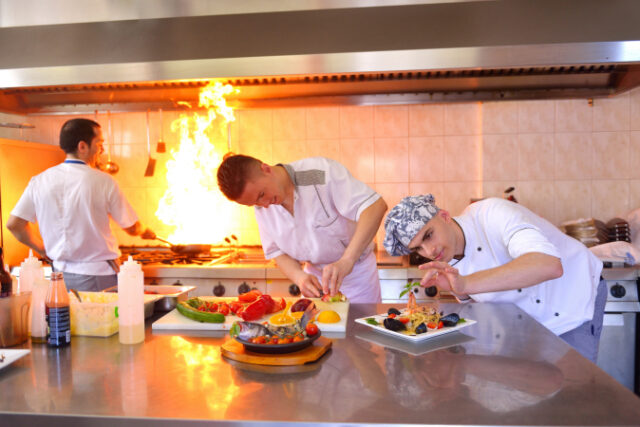
Updated March 24, 2024
Running a restaurant is not like running any other kind of business. More goes into it than just buying food, putting it on plates, and selling the finished product to people. With so many different pieces involved in the process, Mitch Zelman believes that you’ll need to learn many skills before opening your doors for business.
[Background of Mitch Zelman from his Linkedin account: Mitchel Zelman is an E&S broker, leader, and mentor with a passion for business. He currently owns Noodle Station, a fast-casual Asian restaurant. He also owns a consulting company, Last Look Consulting Group, which focuses on sales and mentor training.]
The first consideration is what type of restaurant you want to run and what type of food you’d like to serve. The industry today has so many variations of restaurants, ranging from fine dining or traditional restaurants to fast-casual joints like Chipotle or Eat Noodle Station. Nailing down these details will be huge in determining how much money needs to be invested upfront and what skills are needed by management staff, chefs, etc.

Another consideration is where you are going to open the restaurant. Good foot traffic and potential customers that live in the area will go a long way in making your business profitable. You might not be able to compete with major franchises by opening up shop in a remote location. It’s important to think about where your target market is. For example, fast-casual dining establishments are often in smaller venues located in mini-malls where people frequent and can drop in for a quick and easy bite to eat.
You should also consider the required budget to get started before deciding whether or not this type of investment is feasible for you or if you need to speak with investors. Some menus and cuisines require higher quality ingredients than others, which can drive up your internal costs as well as menu prices. You might also need to purchase specific pieces of equipment to properly run your restaurant (e.g.- a grill, fryer, oven, etc.), and kitchen appliances quickly add up.
Additionally, you have to be comfortable working long hours. Restaurants, along with the rest of the hospitality industry, are incredibly demanding businesses, and owners/managers often end up putting in 60-70 hour weeks to keep things running smoothly. This can take its toll both mentally and physically, so you must enjoy what you do; otherwise, the job will become unbearable very quickly.
Here are a few skills you need to run a successful restaurant:
Leadership Skills
You have to be able to motivate your staff for them to succeed. If you can’t do this, the chances are good that your restaurant will fail, no matter how many hours you put into it personally. The people who work for you need to feel like they want to be there and that their presence is valuable; if not, turnover rates will climb higher than average and morale levels can sink. Retention is always the goal, a high percentage of restaurants’ costs go to labor already, without the additional cost of training new staff members.
Since restaurants operate on very tight budgets, management positions often require more than one person to save money. You might need a head chef (to oversee the food preparation), an assistant manager (to clean and organize everything in sight), and several (to take orders at the front desk and to help out in the kitchen when needed). This can be a challenge if you don’t have good leadership skills, as it can be difficult to manage different people with different personalities and motivations.
Organizational Skills
Running a restaurant is a lot like running a small city. There are dozens of different tasks that need to be completed daily, and if they aren’t done, the restaurant will start to fall apart very quickly. This means that you need to stay organized and keep track of what still needs to be done; otherwise, you’ll quickly lose control over the business.
Communication Skills
The kitchen staff, the waiters/waitresses, and management all need to communicate for things to run smoothly. If your cooks don’t know what ingredients are needed for each day’s menu, they won’t do their jobs properly. If you don’t know how many customers are expected through the doors or how much food is necessary, then you might end up wasting money on ingredients that go uneaten. This means that everyone understands what and when tasks need to be completed.
Problem Solving and Conflict Management
It doesn’t matter how much experience you have with cooking or food service. There are always going to be problems that crop up. The oven could break down. The dishwasher could be doing an insufficient job. You could be unexpectedly short-staffed on the busiest night of the week.
A customer could complain about a hair they find in their soup. These are just some of the things that happen daily. As owner/manager, it’s your job to fix these problems and figure out the best way for them not to come back again.
Attention to Detail
This is a skill that many people think they have, but few do. It’s the ability to look at something and see all of the small details that make up that thing. For example, when you’re creating a dish, you need to see not only what the dish tastes but also how it looks, smells, and feels. This is especially important in the restaurant business as customers are often drawn in by visuals (a beautiful plate of food) before anything else.
Perseverance
Running a restaurant is not an easy task. There are long hours, tight budgets, and high-stress levels to deal with daily. To be successful, you need to be able to persevere through these challenges and continue working hard even when things get tough.
Final Thoughts
If you have the skills listed above (and a few more that we didn’t mention), then you’re well on your way to running a successful restaurant. Just be sure to always stay organized, communicate with your staff, and solve problems as they come up. And most importantly, never give up – the success of your restaurant depends on it.












